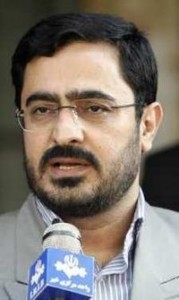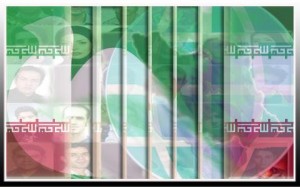The Latest from Iran (18 January): Firewall
 Monday, January 18, 2010 at 19:05
Monday, January 18, 2010 at 19:05  2205 GMT: And Here's Another One. Looks like the campaign against Hashemi Rafsanjani hasn't stopped. Someone in the regime has ensured that he will not be leading the ceremony at Imam Khomeini's memorial on 11 Bahman (1 February), the start of celebrations of Iran's Islamic Revolution.
2205 GMT: And Here's Another One. Looks like the campaign against Hashemi Rafsanjani hasn't stopped. Someone in the regime has ensured that he will not be leading the ceremony at Imam Khomeini's memorial on 11 Bahman (1 February), the start of celebrations of Iran's Islamic Revolution.2200 GMT: Political Teasers. While I've been out, EA readers have been sending in a series of interesting stories on the manoeuvres inside the establishment --- we'll have the best of them, with an analysis, to start Tuesday morning. Meanwhile....
Ayande News continues its campaign against former 1st Vice President and Ahmadinejad aide Esfandiar Rahim-Mashi. The newspaper features the claim that several Rahim-Mashai relatives have been appointed to the board of the state automobile company Saipa, taking a controlling interest.
Rahim-Mashai's son, Reza, has become managing director of Saipa's investment branch while his nephew is now the company's head of business development.
NEW Iran Analysis: How “Mohareb” Death Sentences May Hurt Regime
Latest Iran Video: Marandi on CNN on Detainee Abuses “Mortazavi to Blame” (17 January)
Iran: The Ali-Mohammadi Case “A Political Assassination”
Iran: The Ali-Mohammadi Funeral “The Stolen Coffin”
UPDATED Iran Video & Translation: Dr Etaat’s Opposition On State Media (14 January — Parts 3-5)
Latest from Iran (17 January): Setting Aside Diversions
2150 GMT: More on the assassination of prosecutor Vali Haji Gholizadeh, shot dead in front of his home in Khoy City in Iran's West Azerbaijan province, bordering Turkey and Iraq. A police official says, "A special unit has been formed to identify those behind this assassination."
1935 GMT: Another 5-Point Plan (cont.). Radio Zaamaneh has published an English-language summary of the 5-point plan presented by 34 Iranian women (see 1615 GMT). The signatories, call for an “annulment of all discriminatory and anti-women laws, recognition of women’s right to their body and mind, ending violence against women and prosecution of all perpetrators of the crimes committed in the past thirty years” as part of a resolution of the current crisis. They also support "freedom of thought, speech and assembly", call for an end to torture and the death penalty, and demand “the immediate and unconditional release of all political prisoners”.
The 34 women put their 5 points within the framework of the Islamic Republic, "not changing the president or limiting the power of the leadership; but rather the realization of fundamental and structural changes”.
1920 GMT: Vali Haji Gholizadeh, the prosecutor of Khoy, a town in western Azerbaijan in northwestern Iran, has been killed by a gunshot.
1653 GMT: I'll be away for a few hours for academic and media work, returning about 2100 GMT for an evening update.
1650 GMT: Norooz is reporting that the Qoba Mosque in Shiraz, which was occupied by pro-Government groups who closed the offices of Ayatollah Dastgheib, has reopened.
1615 GMT: Another 5-Point Plan. Responding to and interacting with Mir Hossein Mousavi's 5-point proposal of 1 January, 34 Iranian women have published their own 5-point manifesto for resolution of the political crisis.
1440 GMT: Demonstrations and Trials. One reliable Iranian activist is updating on today's "mohareb" trial of five accused, while another is reporting that 100s of family members of detainees have gathered outside the Tehran Prosecutor General's office.
1145 GMT: Poking at "Foreign Intervention", Chapter 2 (see 0940 GMT). Minister of Interior Mostafa Mohammad Najjar has declared the Islamic Republic will have its revenge on "foreign elements" (and, yes, he means you, Israel) over the assassination of Professor Massoud Ali-Mohammadi.
1130 GMT: The "Mohareb" Trials. Iranian Students News Agency is reporting that five protesters, detained on Ashura (27 December), have gone on trial, accused of "mohareb" (war against God), a charge that could carry the death sentence. The Islamic Republic News Agency has said the five are members of the People's Mujahideen Organisation of Iran (PMOI).
See our related analysis, "How 'Mohareb' Death Sentences May Hurt Regime".
0940 GMT: Mottaki to Britain "We Will Decide If We Like You". Today's poke at "foreign intervention" comes from Iranian Foreign Minister Manouchehr Mottaki, who says: "Iran has carried out a thorough study on its relations with Britain in different fields particularly over the past six months. There are 10-12 working fields between Iran and the UK. We are currently reviewing each area."
No word yet of British panic over the statement.
0800 GMT: The Regime and Mohareb. We've posted a report by Edward Yeranian of Voice of America which points to risks for the regime in threatening death sentences for protesters because they are "mohareb" (warriors against God).
0700 GMT: More on Target Mortazavi. Press TV's website is headlining the letter by 55 members of Parliament to President Ahmadinejad and the head of Iran's judiciary, Sadegh Larijani, "demanding clarification" on the Kahrizak prison enquiry and the case of Saeed Mortazavi.
0650 GMT: And If You're Really Into Battles. On the Ahmadinejad v. Rafsanjani front, Hojetolelam Saghaye Biriaa, an advisor to Ahmadinejad, used a speech to criticise the Green Movement and then attacked the former President, "The Leader’s approach and beliefs are completely different to those of Hashemi Rafsanjani, exactly like Imam Khomeini, whose understanding and beliefs were different to the approach and beliefs of Ayatollah Montazeri."
0640 GMT: Motahhari v. The Government (Round 45). Just to highlight another running story, the "challenge within" from member of Parliament and Larijani ally Ali Motahhari, here are the weekend's headlines:
Motahhari directly criticised Ahmadinejad, accusing him as being one of the principle causes of the post-election crisis and saying he has to apologize to people for his wrong actions. Ahmadinejad advisor Esfandiar Rahim-Mashai responded to a group of journalists: “Firstly, what Motahhari is saying is cheap and baseless and, secondly, we are in the processes of filing a complain against him."
Back came Motahhari, declaring that Mashai should not interfere in and talk about issues which are beyond his "brain capacity" and that he should continue working on his ridiculous plan of Iran-Israel friendship. Then Motahhari returned to Ahmadinejad: the President is like "the person who has caused a big and tragic (car) accident but he has escaped from the scene and we have to try and penalise and punish the person who has the most responsibility".
0600 GMT: Rah-e-Sabz reports concerns over the deteriorating health of Ebrahim Yazdi, the former Foreign Minister and leader of the Freedom Movement of Iran, who has been detained since Ashura (27 December). The 79-year-old Yazdi was also held just after the June election but, on that occasion, was soon released.
0555 GMT: Cyber-War Update: Mahmoud Silenced. President Ahmadinejad's blog is still off-line, weeks after the website was attacked.
0540 GMT: The lead news this morning continues to be the regime's effort at legitimacy through the investigation of the detainee abuses at Kahrizak Prison. A couple of months ago, the speculation was that former Tehran Prosecutor General Saeed Mortazavi would be the fall guy, facing a trial and jail for his supposed lead role in the scandal of beatings and deaths of prisoners. That was deflected by Mortazavi's appointment as an aide to President Ahmadinejad, but now it appears that he is the firewall against challenges to others in the Government and regime, including the Supreme Leader.
We've got the video of the CNN interview in which Tehran University academic Seyed Mohammad Marandi lays out, in the guise of reporting and analysis, the strategy. (Apologies to those of you in the US whom CNN have blocked from seeing the video; the alternative, as laid out by our readers, is to download the video from CNN's Amanpour website and play it back on QuickTime.)
Elsewhere, Agence France Presse picks up on the opening provided by the Islamic Republic of Iran Broadcasting debates, in which some reformists have made telling challenges to the regime. While we have highlighted the remarks of Dr Javad Etaat, posting the video and translation of his contribution, AFP notes the exchange between reformist member of Parliament Mostafa Kavakebian and "hard-line" editor of Kayhan, Hossein Shariatmadari.
 Agence France Presse,
Agence France Presse,  Ali Larijani,
Ali Larijani,  Ali Motahhari,
Ali Motahhari,  Ayatollah Ali Khamenei,
Ayatollah Ali Khamenei,  Ayatollah Ali Mohammad Dastgheib,
Ayatollah Ali Mohammad Dastgheib,  Ayatollah Hossein-Ali Montazeri,
Ayatollah Hossein-Ali Montazeri,  CNN,
CNN,  Ebrahim Yazdi,
Ebrahim Yazdi,  Edward Yeranian,
Edward Yeranian,  Esfandiar Rahim-Mashai,
Esfandiar Rahim-Mashai,  Freedom Movement of Iran,
Freedom Movement of Iran,  Hashemi Rafsanjani,
Hashemi Rafsanjani,  Hojetolelam Saghaye Biriaa,
Hojetolelam Saghaye Biriaa,  Hojetolelam Saghghaye Biriaa,
Hojetolelam Saghghaye Biriaa,  Hossein Shariatmardari,
Hossein Shariatmardari,  Iran,
Iran,  Iran Elections 2009,
Iran Elections 2009,  Iranian Students News Agency,
Iranian Students News Agency,  Kayhan,
Kayhan,  Mahmoud Ahmadinejad,
Mahmoud Ahmadinejad,  Manouchehr Mottaki,
Manouchehr Mottaki,  Masoud Ali Mohammadi,
Masoud Ali Mohammadi,  Massoud Ali Mohammadi,
Massoud Ali Mohammadi,  Mohareb,
Mohareb,  Mostafa Kavakebian,
Mostafa Kavakebian,  Mostafa Mohammad Najjar,
Mostafa Mohammad Najjar,  People's Mujahideen Organisation of Iran,
People's Mujahideen Organisation of Iran,  Press TV,
Press TV,  Rah-e-Sabz,
Rah-e-Sabz,  Saeed Mortazavi,
Saeed Mortazavi,  Seyed Mohammad Marandi,
Seyed Mohammad Marandi,  Voice of America in
Voice of America in  Middle East & Iran
Middle East & Iran 

 2050 GMT: A First Go at Reading Mousavi.
2050 GMT: A First Go at Reading Mousavi.